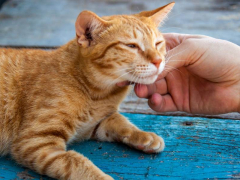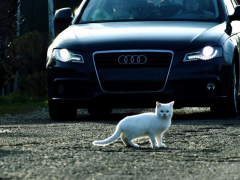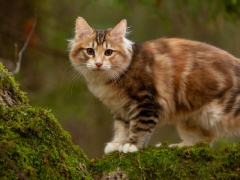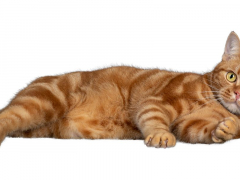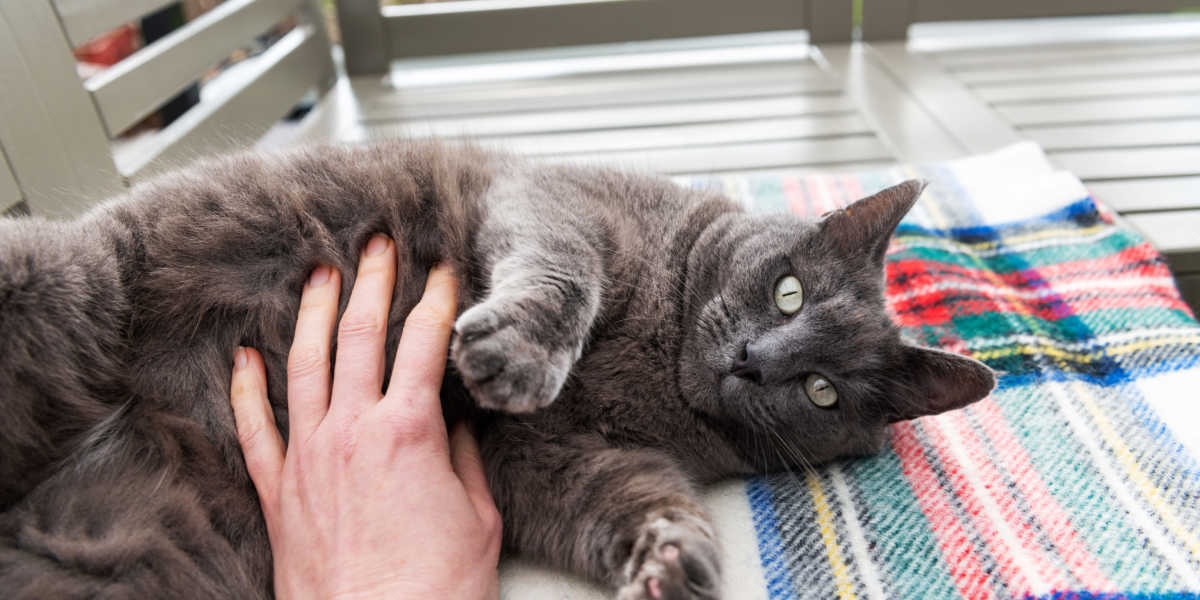
A cat’s belly (abdomen) contains many vital organs, including their stomach and intestines, liver, kidneys, and bladder. A swollen abdomen can merely be a sign of weight gain and a message to cut down on cat food, but it can also be a symptom of many health conditions, some of them life-threatening.
If your cat’s stomach is firm as well as enlarged, this is less likely to be simple obesity, so seek veterinary advice to determine an underlying cause.
Also Read: Do Cats Have Belly Buttons?
Why Is My Cat’s Belly Bloated and Hard?
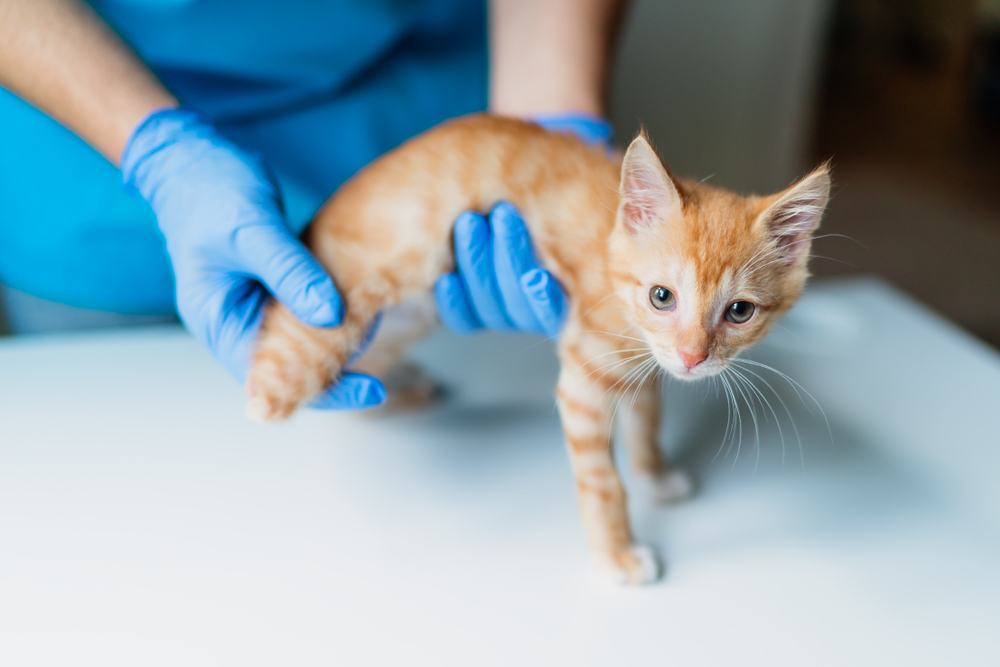
A healthy belly in a normal weight cat should feel soft and should not be bulging.
A cat’s abdominal region is usually soft and relaxed, although many cats aren’t hugely keen on having their belly area examined! In adult cats in good body condition, you should be able to feel the ribs with gentle pressure along their sides and a relaxed curve of the tummy underneath. Cats often have a small “tuck” of skin and fat hanging beneath the abdomen, called the primordial pouch.
There are many causes of belly enlargement in cats, some physiological and some more concerning. The abdominal cavity can become large and firm if excess fluid or gas is present, or if an organ is enlarged, such as with tumors.
Read on to explore the most common causes of a swollen belly in cats.
Also Read: Why Do Cats Show Their Bellies?
1. Obesity
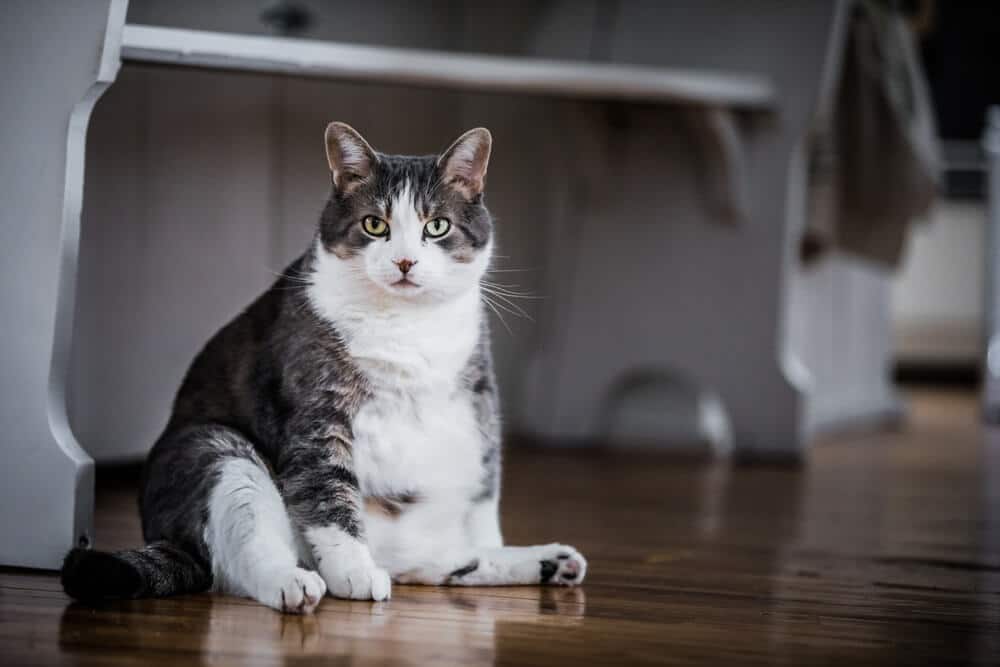
Bellies that are enlarged because a cat is overweight usually feel soft rather than firm.
Overeating can lead to a potbelly or bloated look to your cat’s tummy. However, the belly is often soft when excess fat deposits are the cause of the enlargement, rather than hard or painful. Fat deposits around and under the belly are more commonly seen in the female cat, especially if spayed, but these can occur in any pet cat with a high food intake.
Also Read: Cat Obesity Chart: Find Out if Your Cat is Obese
2. Pregnancy

A pregnant cat’s belly appears large and swollen, and feels firm to the touch.
Cats become sexually mature from around 4 to 6 months of age, and free-roaming females can easily become pregnant at a young age. Cat pregnancy lasts around 63 to 65 days and abdominal enlargement will occur by the mid-late stages. Pregnant cats might show behavioral changes such as nesting as well as a swollen, hard belly.
Also Read: How To Tell If Your Cat Is Pregnant (Top 10 Signs)
3. Constipation
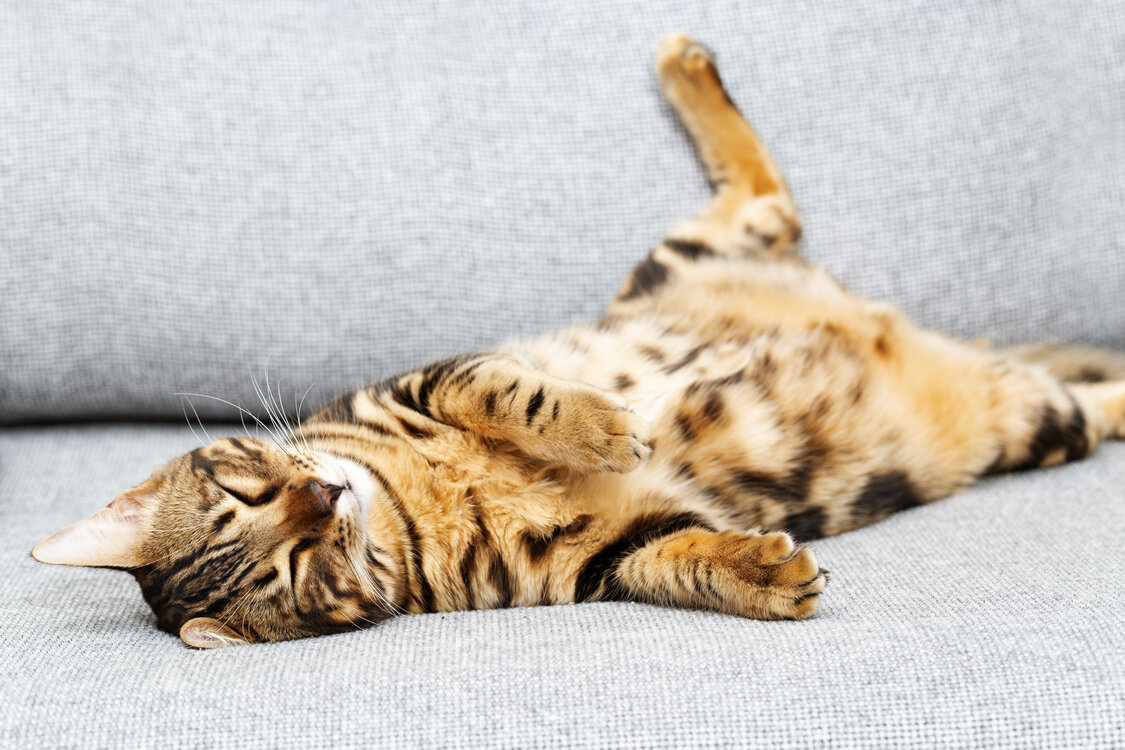
When cats become constipated, their bellies can feel firm and the cat might not want you to touch them there.
A buildup of feces in the colon (constipation) can make a cat’s tummy feel firm. This can be uncomfortable and cats may shy away from their belly being touched. You might also notice them taking constant trips in and out of the litter box or see changes to their appetite.
Also Read: Best Cat Food For Constipation
4. Intestinal Parasites
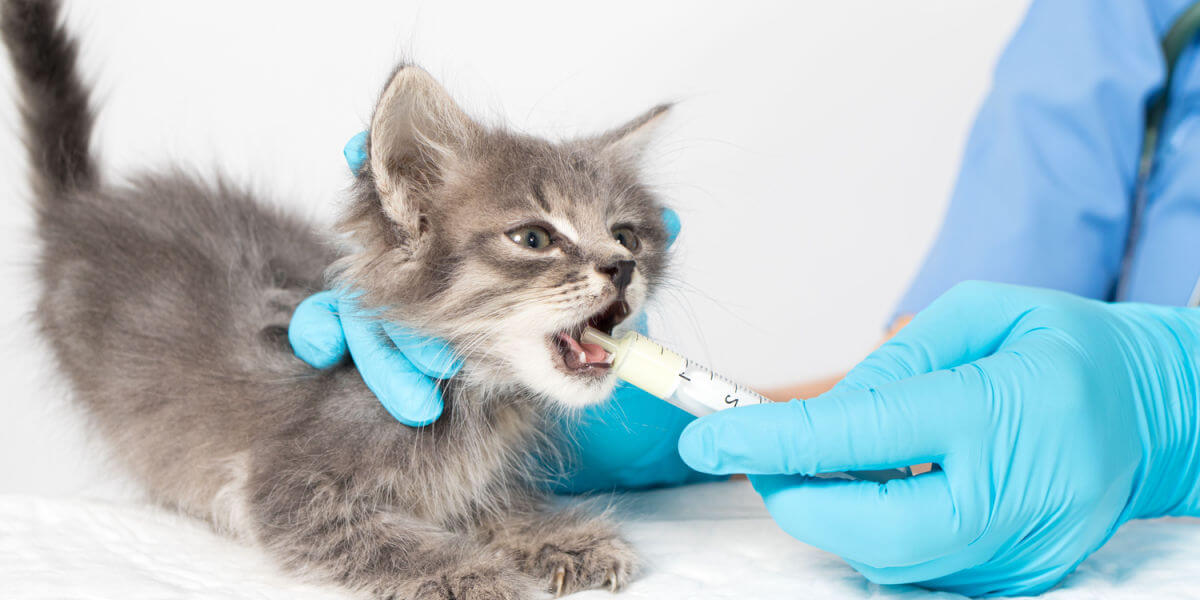
Intestinal worms, which are common in kittens, can cause a pot-bellied appearance.
Worms that infect the gastrointestinal tract can give the appearance of a bloated stomach, especially if there is a large parasite infestation. This is more common in kittens than in older cats. Affected cats will need deworming treatment, which should resolve the pot-bellied look.
5. Organ Enlargement
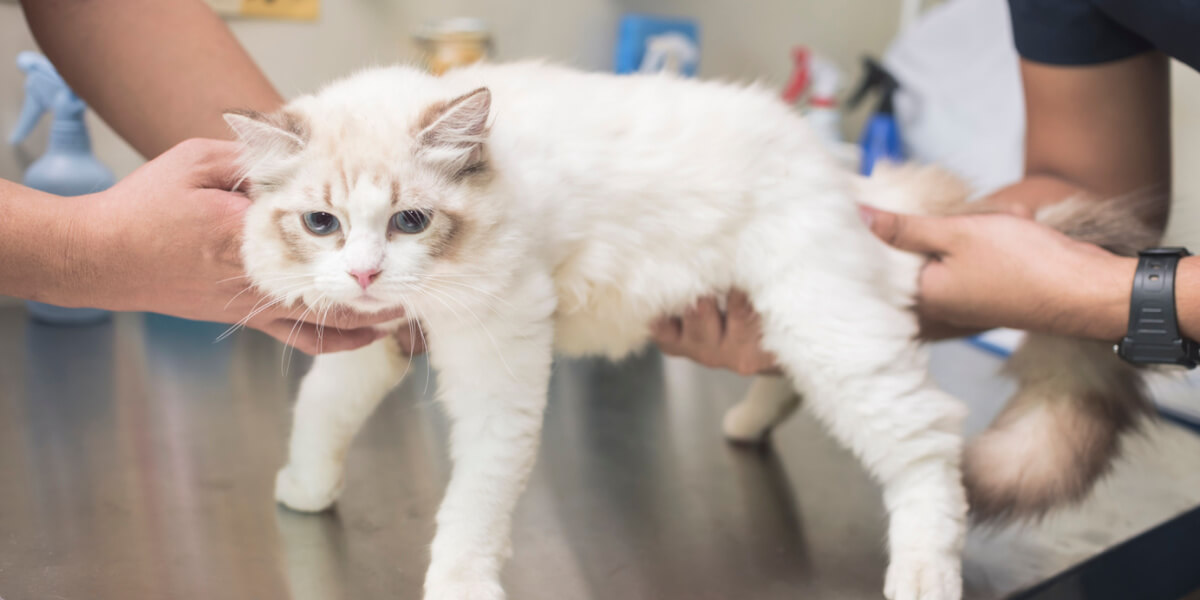
Organs that are abnormally enlarged can make a cat’s belly feel firm and swollen.
If any organ in the abdominal cavity becomes inflamed, infected, diseased, or cancerous, it may swell and enlarge. This can become noticeable externally, leading to the appearance of a swollen belly, which often feels firm to the touch when examined gently.
Organs can change in shape and size for a few reasons, including:
- Tumors can cause enlarged organs with abnormal shape and size, such as the liver, spleen, gastrointestinal tract, or kidneys.
- Organs can also enlarge if infected or inflamed, for example with hepatitis or kidney disease.
- The bladder can become hard and swollen if there is a urinary blockage, usually due to stones, infection, or inflammation.
- The gastrointestinal tract can also become blocked, perhaps with something the cat has eaten, food or poop, hairballs, or worms.
- The uterus can become hard and swollen if a uterine infection (pyometra) is present, filling the organ with large amounts of pus and fluid.
Also Read: 10 Subtle Signs Your Cat May Be Sick
6. Abdominal Fluid
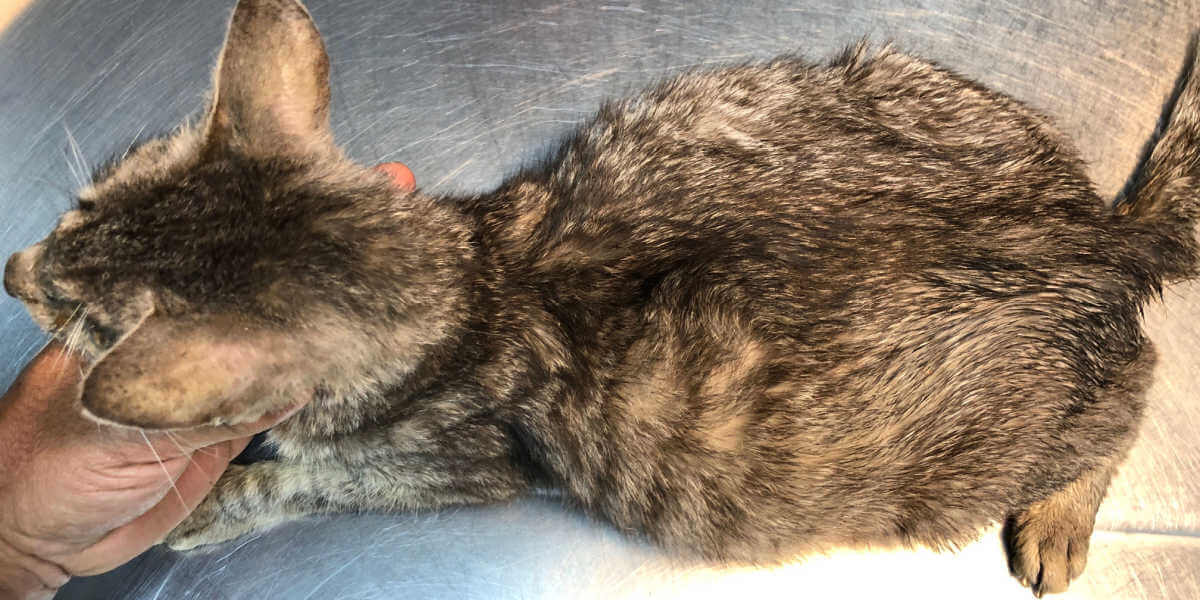
Fluid in the abdomen, a condition known as ascites, makes the belly swollen and hard.
The accumulation of free fluid in the abdominal cavity can lead to a firm, bloated appearance of a cat’s tummy. It is always a cause for concern. The fluid can be sampled by a veterinarian to discover the type: this can be urine, blood, or an effusion (fluid leaked from bodily tissues).
- Urine will be present if there is damage to the bladder or urinary system.
- Blood can be found after trauma/injury, post-surgery, with certain tumors, or due to a blood clotting disorder.
- Various types of effusion will be leaked with health conditions such as cancer, liver disease, heart disease, and infection or inflammation of the abdomen itself.
- Some infectious diseases such as feline infectious peritonitis (FIP) can cause fluid to accumulate in the belly.
Also Read: Why Don’t Cats Like Their Belly Touched?
7. Other Causes Of Swollen Belly In Cats
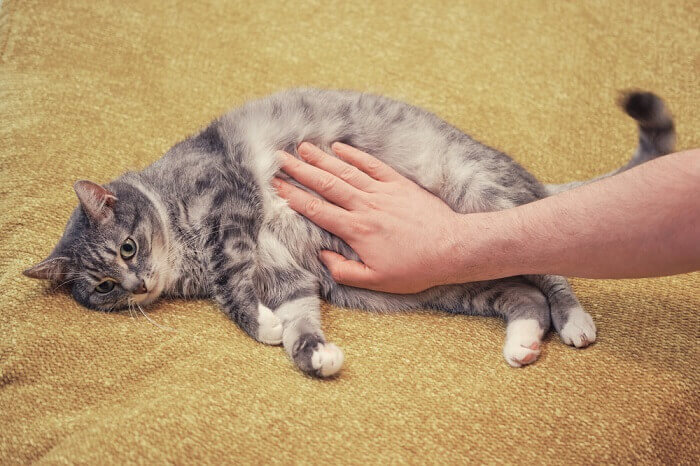
Cats can develop a swollen belly due to gas accumulation or in some cases, serious diseases like hypothyroidism.
There are some other reasons why your cat’s belly may feel firm, but they are less likely in cats. Gas accumulation, Cushing’s disease, and hypothyroidism are all rare causes of a swollen belly in cats. Kittens are more prone to gaseous bloat after a large meal, as are adult cats who eat very fast or gulp lots of air as they eat.
Also Read: Hyperthyroidism In Cats: Symptoms, Treatment & Causes
When To Worry?
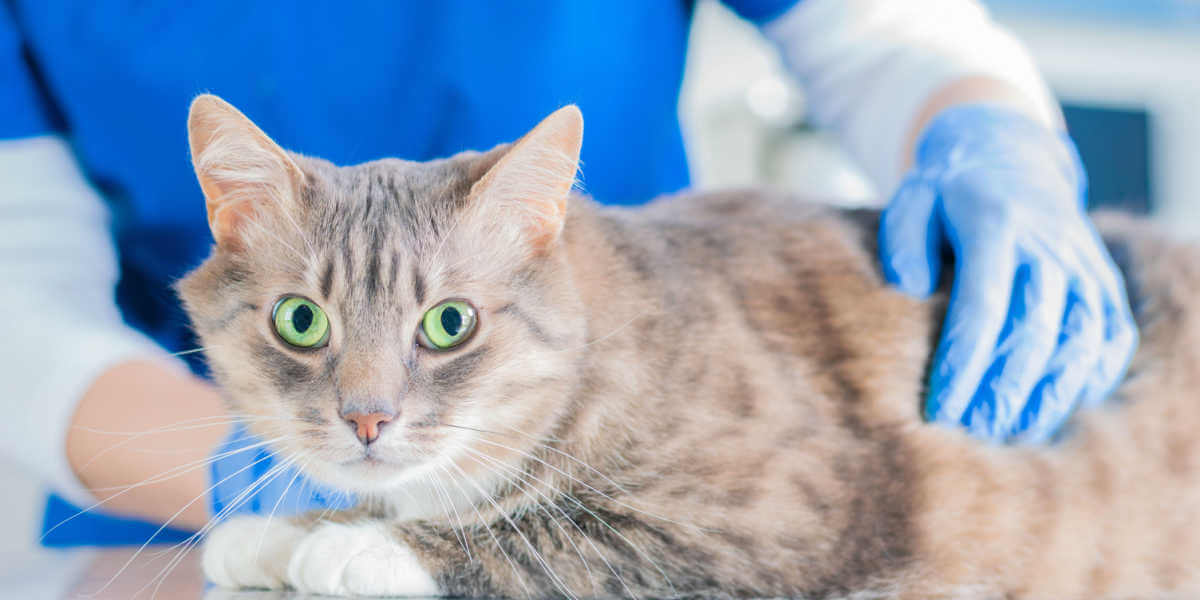
If your cat’s belly feels firm, and you’re not sure what’s causing it, schedule an appointment with your veterinarian for a checkup.
It can be difficult to know when to be concerned when it comes to your beloved cat. It is a good habit for pet owners to regularly check their pets over, looking at their skin and coat, ears, eyes, teeth, tummy, and paws to check for any changes or abnormalities. This could be done as part of a grooming regime, for example. Knowing what your cat’s belly usually feels like is helpful to be able to detect any changes early.
If you’ve noticed your cat’s belly feels firm, here are some useful questions to ask yourself:
- Have you changed your cat’s food recently? Think about your cat’s appetite, and check that your cat is being fed the right amount for their age and size.
- Could your cat be pregnant? If your cat is a female, is unspayed, and has access to the outdoors this is a distinct probability.
- How are your cat’s appetite, thirst, and litter box habits? A change in drinking, urination, poop, or appetite could be significant.
- Has your cat’s belly changed size quickly? Or has their tummy grown very slowly over time? A rapid change is more concerning for underlying disease.
- Does your cat seem otherwise well? Consider any other symptoms, such as vomiting or diarrhea, coughing or sneezing, any discharge, or signs of discomfort.
If your cat has an enlarged tummy, it is always best to seek veterinary advice. They can examine your cat thoroughly and discuss any potential problems. Your veterinarian might recommend further testing such as blood tests, urinalysis, and imaging such as x-rays. If fluid is found, this may be sampled using a needle (abdominocentesis), and tumors might require a biopsy.
Also Read: 10 Most Dangerous Diseases In Cats
Cat Belly Feels Firm: Final Thoughts
Cats come in all shapes and sizes, and some are definitely on the chunkier side than others. However, a swollen or firm belly is not normal in cats and can indicate a health problem. If your cat’s belly has changed and feels large, swollen, or firm, it’s time for an appointment with a veterinarian for investigation.
Also Read: 9 Cat Behavior Changes To Worry About
